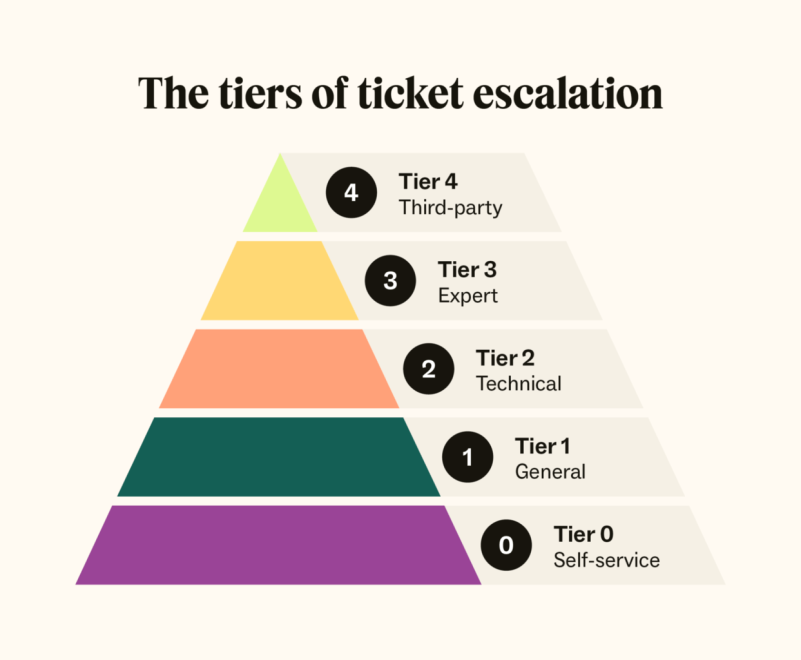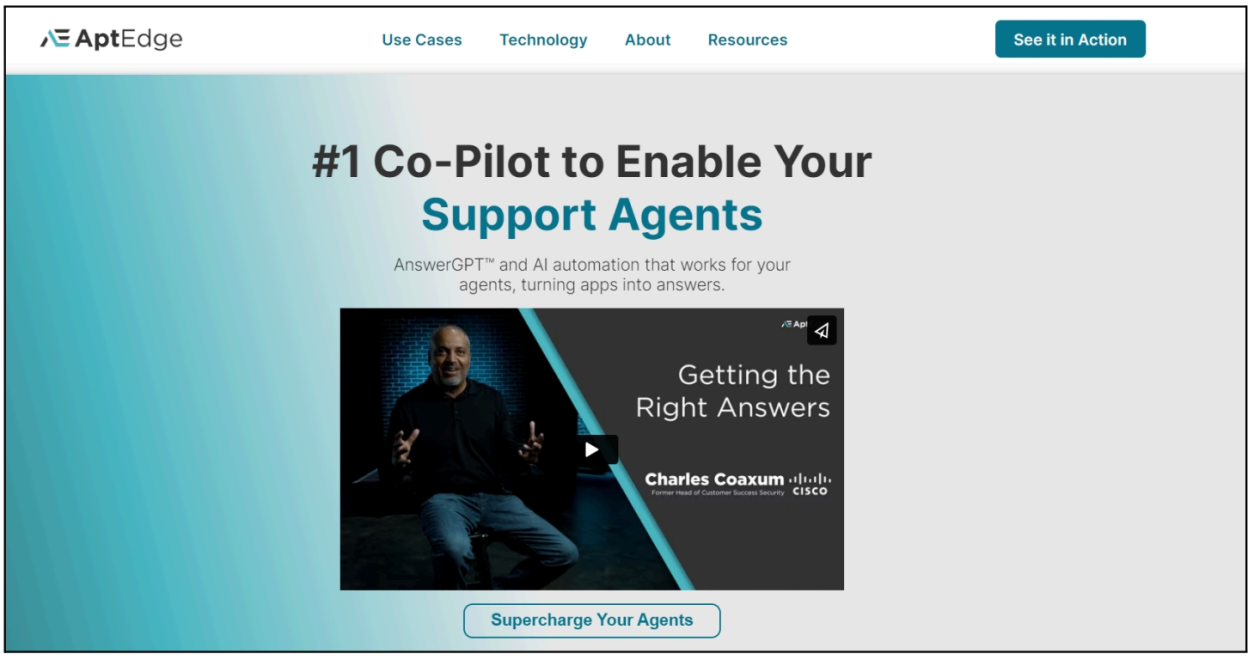Have you heard the term, “ I want to speak to the manager?”. This is what B2B escalations look like. Since technical customer support agents are the first point of contact if a customer faces issues, and their ability to resolve the problem can determine whether the issue will be escalated to tier 2 agents.
But ultimately, it’s important to understand that humans have limited capacities compared to machines and that human intelligence must be saved for critical queries. That’s where AI tools like AptEdge are revolutionizing the B2B customer support industry. With advanced AI capability, AptEdge fills the knowledge gaps that present amongst customer support agents at tier 1 and tier 2 levels. Using the company’s data, AptEdge helps agents quickly gather accurate information to resolve client issues. This way, the majority of issues are handled in lower tiers, and escalation is drastically reduced.
Key Takeaways
- Understand what escalation management is
- When does escalation happen in B2B
- How to Anticipate and Avoid Escalation in Customer Support?
- How is AI helping companies reduce escalation and improve customer satisfaction?
What Is Escalation Management In Technical Customer Support?

Sometimes, the customer support agent at a lower level cannot resolve the client’s problem. In such cases, the matter is escalated to a higher, more experienced personnel. The primary goal of escalation management is to ensure that client concerns are addressed effectively and efficiently, thereby maintaining high client satisfaction and trust. Many B2B businesses have a tiered approach to escalate a ticket. This tiered escalation process has a particular hierarchy, as shown above. It majorly consists of 4 tiers.
- Tier 0 consists of self-service channels, such as a knowledge base or helpdesk software, so customers can resolve simple issues themselves.
- Tier 1 includes ground-level support agents who follow Standard Operating Procedures like scripts to resolve simple customer issues.
- Tier 2 consists of technical agents who can troubleshoot and solve complex problems.
- Tier 3 has developers or engineers with expert knowledge to create custom solutions for client complaints.
When Does Escalation Happen From Your B2B Customers?
Escalation from B2B customers happens when their concern is not resolved by the initial agent, either due to a lack of expertise or authority. This leads to dissatisfaction and them wanting to move forward with more experienced or skilled agents.
On the other hand, escalations with support agent staff can be classified into functional escalation, automated escalation, and hierarchical escalation.
1. Functional Escalations
Functional escalation occurs when a support representative cannot resolve a customer’s request within their regular area of responsibility.
For example, suppose you are a B2B firm dealing with CRM software. A customer has what starts as a basic question but escalates promptly to a more complicated issue that could involve platform architecture. Agents are trained to transfer these cases to more skilled & experienced agents.
2. Automated Escalations
This escalation is done using an automated system that escalates customer issues based on predefined criteria. Automated systems can be set up in such a way that if a specific keyword is mentioned in the customer query, then the issues are automatically escalated to a certain representative who has proper knowledge.
For example, suppose you receive a complex technical query that can only be resolved by agents at the expert level. Here, you can set up an automated escalation system so that complex technical queries are automatically escalated to the relevant department.
3. Hierarchical Escalations
Hierarchical escalation involves elevating a customer’s concern up the chain of command when the representative cannot provide a satisfactory solution.
For example, consider that a customer support staff escalated the issue to tier 2, which is the technical tier, but then they could not resolve it. So it is escalated to tier 3, which is the expert level.
How to Anticipate and Avoid Escalation in Customer Support?
Escalations can be time-consuming and tiring for everyone. Hence, it’s important that most customer problems are resolved at lower levels, as this not only saves everyone’s time but also energy. Some expert techniques exist to anticipate and avoid escalations in customer support.
1. Use Knowledge Base to Answer General Queries
One of the first steps to avoid Escalations in customer support is to create a knowledge base of general queries related to the products and services you provide. This filters out customers who might be escalating issues for general queries that can be resolved without human-agent support. Whenever customers face an issue, they will first try to find the answer on their own and apply the steps mentioned.
2. Set Clear Expectations
Sometimes, customers can be extra demanding. In such cases, your customers must know company policies and timelines for resolution. Being transparent about limitations prevents misunderstandings that could escalate.
3. Improve Communication Channels
Today, even B2B customers expect you to be present on multiple communication channels. If email is your only communication channel, switch to an omnichannel approach. Offer options like live chat, email, and self-service portals so customers feel heard and supported.
4. Remain Well Informed About Customer Issues
According to Gartner customer experience statistics, 86% of B2B customers expect companies to be well-informed about their personal information during service interactions. If you are well informed, then the chance of issues going out of control slides down drastically.
Why is it important to train de-escalation skills in technical Customer Support Agents or Engineers?
Managing customers can eventually leave agents feeling apathetic, a symptom of burnout. Hence, training technical customer support agents and engineers with de-escalation skills is important to cope better under stressful conditions. Here are some of the reasons why it’s critical.
1. Reduce stress and burnout
Dealing with angry customers is emotionally taxing for support agents. Training will help them manage emotions and composure to find timely solutions without leading to burnout.
2. Enhance communication skills
The major part of de-escalation training focuses on proper communication skills, active listening, and empathy. All these skills help technical customer support agents understand the user’s issues effectively and resolve their problems.
3. Improved customer satisfaction
When technical customer support agents use de-escalation skills to resolve issues respectfully, customers become happier and more satisfied. Hence it leads to an increased loyalty rate as satisfied customers are more likely to continue doing business with the company.
Tips to Avoid Escalations in Common High-Conflict Situations with B2B Customers
1. Have an escalation protocol
Establishing escalation protocols for handling complex issues is critical. Protocols ensure that issues are prioritized based on their urgency and importance. Ensure every team member is aware of escalation protocols and knows how to identify, prioritize, and categorize escalated cases and how to escalate them to the right person or team. It’s critical to understand how to communicate the status and expectations to the customer and other stakeholders and how to document and follow up on the case until it is closed.
2. Take the ownership
Another key tip to handle high conflict escalation is by taking ownership. Taking ownership means accepting responsibility for the issue and finding the solution without making excuses.
3. Keep customers updated
No communication is the worst kind of communication. When customers don’t get timely updates, they quickly assume you don’t care. That’s where things go out of control. To avoid escalation in such situations, you must maintain transparency by keeping customers informed about the status of their queries, especially in critical situations. Regular updates and clear communication can build trust and reassure customers that their concerns are being addressed
Role of AI in Customer Escalation Management
AI plays a bigger role in customer support than we can imagine. Behind the scenes, proper use of Artificial intelligence in customer escalation management can remove pressure from your team by:
- Automatically escalating certain issues to higher management
- Provide agents with tips and feedback in real-time
- Gathering data from recorded conversations to inform future coaching and training around escalations
AI tools like AptEdge.io leverage the power of Artificial Intelligence to help businesses manage and reduce customer escalations effectively. So, how does AptEdge handle it? Let’s have a look.

1. Connects customer service teams to relevant information and knowledge
AptEdge harnesses unified search to organize scattered knowledge sources, contextualize the information, and then search for the right answers– providing instant and accurate answers in real-time. This reduces the efforts that agents have to make to search for proper answers.
2. Analyzing customer complaints and issues to identify patterns and trends
AptEdge analyzes customer complaints to identify patterns, thus enabling businesses to address customer concerns more efficiently and proactively. This also helps in reducing ticket volumes as immediate action is taken.
3. Providing real-time responses to customer inquiries
It’s tiring to keep typing the same answers repeatedly.AptEdge reduces this by automatically generating real-time responses to reduce the workload on customer support staff, reducing the workload for customer support staff and allowing them to focus on more complex escalated cases.
Conclusion
Managing customer escalations effectively is crucial to maintaining high customer satisfaction in business. However, proper escalation management requires training customer support agents with escalation skills to reduce their stress and burnout.
Pairing the training with AI tools like AptEdge.io can streamline the escalation process, providing real-time solutions and reducing the overall workload on support staff. By prioritizing de-escalation training and adopting advanced technological solutions, companies can foster a more positive and productive support environment, ultimately benefiting employees and customers.
FAQ
1. What is B2B customer support de-escalation training?
B2B customer support de-escalation training helps customer service agents learn how to manage and resolve conflicts with business clients effectively. It teaches them to calm upset customers, understand their concerns, and find solutions for both parties.
2. What are the key skills for effective conflict resolution in B2B customer support?
Key skills for effective conflict resolution in B2B customer support include empathy, emotional control, de-escalation techniques, problem-solving skills, active listening, a positive outlook, and assertiveness.
3. What are the financial benefits of de-escalation training?
The financial benefits of de-escalation training include reduced lost workdays, improved staff retention, and reduced overall expenditure. Hence, by investing in de-escalation programs, your business can save costs related to staff turnover and reduce complaints, legal issues, and lost productivity in the workplace.
4. What are the key elements of a good de-escalation training program?
The key elements of a de-escalation training program include clear objectives, techniques for active listening, cultivating empathy and positive communication, building trust and understanding with customers, skills for accurately judging the conflict situation, and choosing proper de-escalation strategies.
5. How can de-escalation training benefit my business?
De-escalation training can benefit your business in several ways. Firstly, it improves employee relationships by promoting active listening. Secondly, it cultivates a more positive environment with improved trust, teamwork, and morale. Last but not least, it enhances customer loyalty and satisfaction.
Subscribe for more Knowledge
Get more insights on technical support excellence: